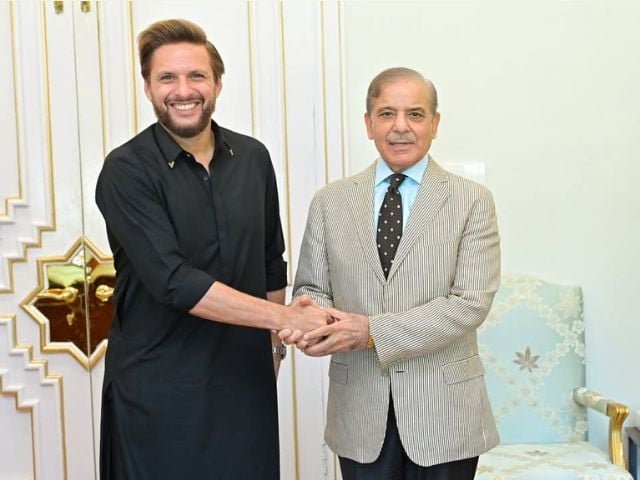
Afridi Backs PM Shehbaz, Hails Pakistan’s Strike on India
Shahid Afridi Meets PM Shehbaz, Applauds Operation Bunyanum Marsoos
Former Pakistan cricket captain and celebrated all-rounder Shahid Khan Afridi met Prime Minister Shehbaz Sharif at the PM House in Islamabad, where he congratulated the premier on the resounding success of Operation Bunyanum Marsoos.

Federal Information Minister Attaullah Tarar was also present during the meeting. Afridi lauded Pakistan’s armed forces for delivering a strong and unified response to Indian aggression, stating, “At this critical moment, the entire nation stood together to send a powerful message to the enemy.”
Prime Minister Shehbaz thanked Afridi for his support and commended his solidarity with the armed forces and the public, particularly during the recent “Youm-e-Tashakur” (Day of Gratitude) rally.
Afridi has been a vocal critic of the Indian government, especially during the recent escalation in tensions following the Pahalgam attack in India-Occupied Jammu & Kashmir, which claimed 26 lives. India blamed Pakistan without evidence, sparking a series of diplomatic and military escalations.
Condemning what he described as a “false flag operation,” Afridi called the Modi government “inept” and accused Indian forces of targeting civilians and religious sites. He mocked Indian media’s sensationalist war coverage, branding it “Cartoon Network journalism.”
Following these comments, India reportedly blocked Afridi’s YouTube channel along with 15 others, including those of ex-cricketers Rashid Latif, Shoaib Akhtar, and Basit Ali.
Afridi, speaking at a rally in Karachi, reiterated that India had underestimated the resolve of Pakistan’s military and people. He further criticised Modi’s international reputation, pointing to allegations involving attacks on Sikh activists abroad.
The conflict peaked with Indian missile strikes on May 7, which were met with a decisive Pakistani counteroffensive—Operation Bunyanum Marsoos—that targeted Indian military infrastructure. The hostilities ceased on May 11 following diplomatic intervention by U.S. President Donald Trump.
